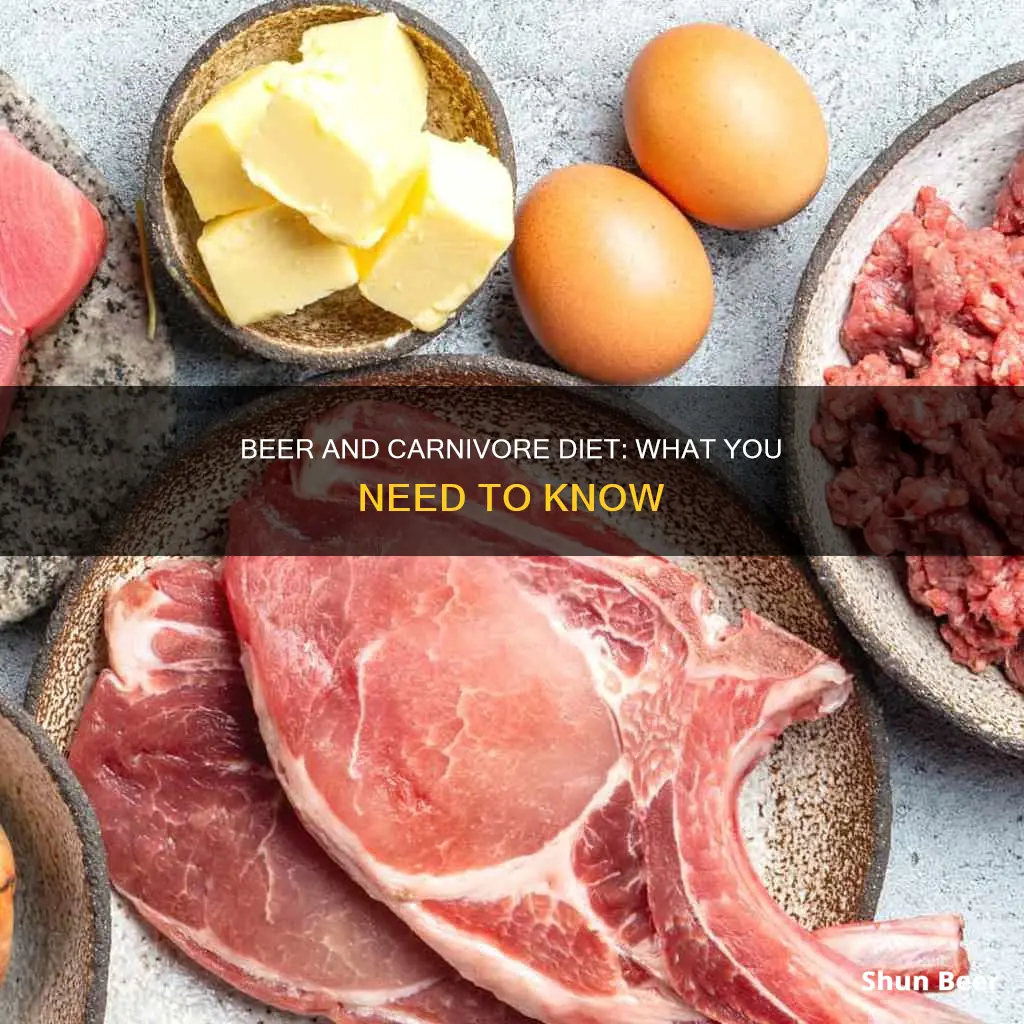
The carnivore diet is a restrictive, animal-based diet that focuses on eating meat, fish, eggs, and certain dairy products. It is a low-carbohydrate, high-protein diet that aims to induce a state of ketosis and reduce inflammation. Alcohol is made from fermenting grains and fruits, which are not animal products, and therefore does not align with the carnivore diet.
Alcohol can negatively impact the health goals of those on the carnivore diet as it can disrupt metabolism, increase food cravings, and lead to addiction. It can also cause intense hangovers due to the absence of carbohydrates in the carnivore diet. However, some proponents argue that certain types of alcohol, like spirits or dry wines, can be consumed in moderation.
So, can you drink beer on the carnivore diet? Beer is typically high in carbohydrates and not recommended on the carnivore diet. However, individuals may choose to consume low-carb beers or other alcoholic beverages in moderation, understanding the potential impact on their health and diet efficacy.
What You'll Learn
- Beer is not carnivore-friendly due to its grain base and high carbohydrate content
- Alcohol is not recommended on the carnivore diet as it can increase inflammation and hinder weight loss
- Alcohol is a toxin that can negatively affect both physical and mental health
- Alcohol is addictive and can lead to an unhealthy relationship with food and drink
- Alcohol can cause severe hangovers due to the absence of carbohydrates in the carnivore diet

Beer is not carnivore-friendly due to its grain base and high carbohydrate content
The carnivore diet is an animal-based diet that includes meat and other animal products like cheese, butter, poultry, organ meats, fish, eggs, and dairy. It is considered a "paleo" diet, as it relies on foods likely eaten by prehistoric humans. The diet is popular among those seeking improved health, simplicity, nutrient density, and increased energy levels. Many people on the carnivore diet also report successful weight loss and reduced inflammation in the body.
Alcohol, on the other hand, is a toxin that can negatively affect both physical and mental health. It interferes with metabolism, increases food cravings, disrupts ketosis, and can lead to weight gain. These effects can hinder the benefits of the carnivore diet, such as improved metabolic health and reduced risk of chronic diseases. Additionally, the carbohydrates in beer can knock you out of ketosis and affect your fat-burning capabilities.
While some people on the carnivore diet may choose to consume alcohol occasionally, it is important to note that it is not recommended and can have negative consequences on overall health and progress. If you choose to drink alcohol while on the carnivore diet, it is best to opt for low-carb options such as pure spirits, dry wines, or sugar-free hard seltzers. However, even these options can still interfere with the benefits of the carnivore diet due to the effects of alcohol on the body.
Drinking Beer on a Boat: Florida's Laws
You may want to see also

Alcohol is not recommended on the carnivore diet as it can increase inflammation and hinder weight loss
Alcohol can negatively impact your health goals if you are on the carnivore diet. Firstly, it can interfere with metabolism and ketosis, which are crucial to the carnivore diet. Alcohol takes priority over fats and proteins as the body's primary source of energy, which can slow down weight loss efforts. Alcohol is also associated with an increased risk of developing gallstones, pancreatitis, and other digestive problems, as well as certain types of cancers.
Secondly, alcohol can cause intense food cravings, especially for high-carb and sugary foods that are off-limits on the carnivore diet. It stimulates the reward centres in the brain, similar to sugar, and can lead to unhealthy eating choices. This can work against the benefits of the carnivore diet, such as weight loss and improved metabolic health.
Thirdly, alcohol consumption can result in severe hangovers on the carnivore diet due to the faster absorption rate of alcohol in the absence of carbohydrates. This can affect your mood, sleep quality, and energy levels, making it challenging to stick to the diet.
Lastly, alcohol impairs judgment and weakens willpower, making it difficult to maintain discipline and portion control, which are crucial to the success of the carnivore diet.
While occasional drinking is not expected to have major health consequences, regular or heavy drinking could throw you off track from your health and weight loss goals on the carnivore diet. Therefore, if you choose to drink alcohol while on this diet, it is recommended to do so in moderation and opt for low-carb, low-calorie beverages.
Crafting Beer: My Career Choice and Passion
You may want to see also

Alcohol is a toxin that can negatively affect both physical and mental health
Alcohol also slows down the brain's information processing, making it harder to think clearly and consider the consequences of one's actions. This can lead to reckless or aggressive behaviour and increase the risk of accidents or becoming a victim of violence.
Long-term alcohol misuse increases the risk of serious health conditions, including heart disease, stroke, high blood pressure, liver disease, and cancer. It can also lead to social problems such as relationship issues, unemployment, financial difficulties, and homelessness, all of which can further impact mental health.
Alcohol misuse and mental health problems are closely linked. Research shows that people who drink alcohol are more likely to develop mental health issues, and those with severe mental health problems are more likely to misuse alcohol. This may be because they self-medicate, trying to manage their symptoms or difficult feelings. Alcohol can provide temporary relief but can worsen symptoms over time and lead to a cycle of dependence.
Alcohol can affect mental health in several ways:
- It can worsen existing mental health conditions, such as depression and anxiety.
- It can increase the risk of developing mental health disorders.
- It can interfere with the treatment and management of mental health conditions.
Alcohol can also negatively impact physical health:
- It can cause metabolic problems by reducing the rate at which the body turns food into energy, leading to weight gain, fatigue, low energy levels, and hormonal imbalances.
- It can disrupt gene expression and the performance of neuronal circuits, leading to alcohol use disorder (AUD) and addiction.
- It can cause inflammation and organ damage, including intestinal inflammation, which can compromise intestinal immune function.
- It can increase food cravings by stimulating the reward/pleasure centres in the brain.
- It is high in calories and can contribute to weight gain.
- It can negatively impact ketosis and liver function, especially when combined with a diet high in fatty meats.
- It can cause hangovers, including headaches, nausea, and vomiting.
In conclusion, alcohol can have detrimental effects on both physical and mental health. While occasional consumption may not cause significant harm, regular and excessive drinking can negatively impact overall health and well-being.
The Ultimate Guide to Choosing the Perfect Beer
You may want to see also

Alcohol is addictive and can lead to an unhealthy relationship with food and drink
Alcohol is a substance that can be addictive, and its consumption may lead to an unhealthy relationship with food and drink. Alcohol is made by fermenting grains and fruits, which means it is not compatible with the carnivore diet, a strict animal product-based diet. While some may argue that occasional drinking will not affect one's health or the effectiveness of the diet, the addictive nature of alcohol can make it challenging to control consumption.
Alcohol has the potential to interfere with metabolism and disrupt progress towards weight loss or improved metabolic health. It can also increase food cravings, especially for high-carb and sugary foods that are off-limits on the carnivore diet. The reward centres in the brain that are stimulated by alcohol are similar to those activated by sugar, and studies suggest that consuming sugar can lead to alcohol use. This overlap in brain activity can make it challenging to adhere to the strict carnivore diet, as alcohol may increase the desire to consume non-compliant foods.
Additionally, alcohol can impair judgment and decision-making abilities, making it more difficult to maintain discipline with the carnivore diet. It can also increase the risk of relapse for recovering addicts or occasional drinkers who are trying to live healthier lives. The depressant effects of alcohol can impact an individual's willpower, making it challenging to maintain portion control and increasing the likelihood of overeating.
Furthermore, alcohol can negatively impact metabolic health, especially for those following a high-fat, low-carb diet like the carnivore plan. Alcohol is prioritised by the body for energy over fats and proteins, which can hinder weight loss efforts. It can also cause long-term damage to metabolism, leading to weight gain over time.
In conclusion, while alcohol consumption may be tempting, it is important to recognise its potential negative impact on the carnivore diet. The addictive nature of alcohol, its interference with metabolism, its stimulation of food cravings, and its impact on willpower and decision-making can create an unhealthy relationship with food and drink. Therefore, it is crucial to prioritise the carnivore diet over regular alcohol intake for optimal health.
Drinking Beer Post-Plasma Donation: What You Need to Know
You may want to see also

Alcohol can cause severe hangovers due to the absence of carbohydrates in the carnivore diet
The absence of carbohydrates in the carnivore diet can also lead to faster absorption of alcohol, resulting in higher blood alcohol levels. This, in turn, contributes to more severe hangover symptoms, including headaches, nausea, and reduced sleep quality. Additionally, the lack of carbohydrates can affect the body's ability to process alcohol, leading to a longer duration of intoxication and an extended recovery period.
It is important to note that the combination of a carnivore diet and alcohol consumption can also impact an individual's willpower and decision-making abilities. Alcohol is a depressant that slows down the central nervous system, impairing judgment and increasing the likelihood of making unhealthy food choices. This can lead to a loss of discipline and deviation from the strict carnivore diet.
Furthermore, alcohol can interfere with the body's ability to metabolise dietary fats efficiently. It slows down the absorption rate of nutrients, negatively impacting weight loss or maintenance efforts for those on the carnivore diet. The disruption in metabolic functions can also lead to increased food cravings, particularly for high-calorie and high-carbohydrate options.
While occasional moderate alcohol consumption may not have major health consequences, it is important to be mindful of the potential risks and impacts on the body when combining it with the carnivore diet.
Cialis and Beer: A Safe Mix?
You may want to see also
Frequently asked questions
Beer is not considered compatible with the carnivore diet as it is made from grains and often contains carbohydrates and sugars that are not allowed on this diet.
Drinking beer can disrupt ketosis, cause inflammation, increase food cravings, and lead to weight gain. It can also negatively impact metabolic health and liver function.
Light beers or low-carb beer alternatives are available and may be more suitable for the carnivore diet as they contain fewer carbohydrates. However, it is important to read the labels as carb content can vary between brands.
Alcohol can interfere with metabolism, increase food cravings, and cause more intense hangovers. It can also affect decision-making abilities and willpower, making it challenging to stick to the strict carnivore diet.
While it is generally recommended to avoid alcohol on the carnivore diet, occasional moderate intake may be acceptable for some individuals. If you choose to drink, it is important to prioritise low-carb and low-sugar options such as pure spirits, dry wines, or sugar-free hard seltzers. However, keep in mind that alcohol is a toxin and can negatively impact your health, especially when consumed in excess.







